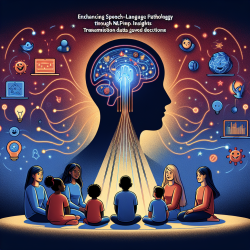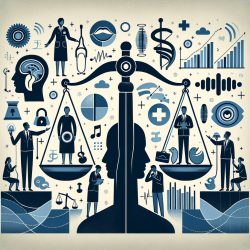Introduction
As practitioners in the field of speech language pathology, we are constantly seeking ways to improve outcomes for children. The integration of technology, particularly natural language processing (NLP), offers promising advancements. A recent study, "Natural language processing for abstraction of cancer treatment toxicities: accuracy versus human experts," highlights the potential of NLP in extracting critical data from clinical notes, which can be adapted to enhance our practice.
The Study's Key Findings
The research assessed the accuracy of an NLP pipeline in identifying symptoms from clinical notes compared to human experts. The study demonstrated that NLP could accurately detect present symptoms, such as radiation dermatitis, fatigue, and nausea, with high precision and recall. However, it showed limitations in detecting negated symptoms.
Implications for Speech Language Pathology
While the study focused on oncology, the principles of NLP can be applied to speech language pathology. Here are some ways NLP can enhance our field:
- Automated Data Extraction: NLP can streamline the extraction of relevant data from clinical notes, allowing practitioners to focus more on direct therapy rather than administrative tasks.
- Improved Symptom Identification: By accurately identifying symptoms, NLP can help tailor therapy plans to the specific needs of each child, enhancing therapeutic outcomes.
- Consistency in Documentation: NLP can provide a consistent method for documenting symptoms and progress, reducing variability and improving the quality of care.
Encouraging Further Research
While the current study provides a foundation, further research is necessary to adapt NLP tools specifically for speech language pathology. Practitioners are encouraged to engage in research that explores the customization of NLP for identifying speech and language symptoms, which could revolutionize how we approach therapy.
Conclusion
Integrating NLP into speech language pathology holds significant potential for improving child outcomes. By automating data extraction and enhancing symptom identification, NLP can free up valuable time for practitioners to focus on delivering personalized therapy. As we continue to explore these technological advancements, the future of speech language pathology looks promising.
To read the original research paper, please follow this link: Natural language processing for abstraction of cancer treatment toxicities: accuracy versus human experts.










